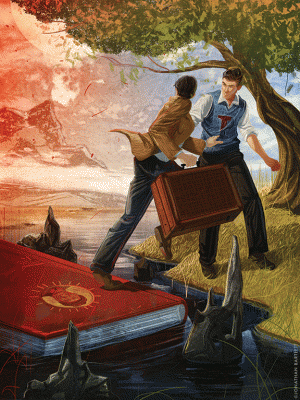
More than 80 years ago, the paths of two Penn students—one from China, the other from New Jersey—intersected. The resulting friendship changed their lives, and those of their families.
BY CHRISTINE LUTTON FOSTER | Illustration by Jonathan Bartlett
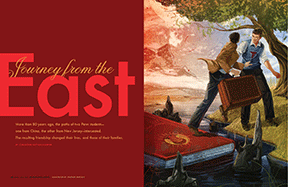
The first thing Douglas Hsu noticed when he woke was the damp, cool darkness. He was nine years old, and his bed—the dirt floor of a cave in rural China—was like nothing he had ever slept on. With him were his mother and a handful of other refugees, waiting for nightfall to travel again. Then the men would wade into the water and push the small boats out into the river. By muffling the sound of paddles hitting water, they hoped to avoid detection by Mao Zedong’s People’s Liberation Army, whose soldiers were swarming near Shanghai.
One can only imagine that Doug thought wistfully of everything that his family had left behind. Their life in the upper echelons of Chinese society was one of almost unimaginable privilege. Doug’s father, Sui-Lin Hsu W’34, was the oldest son of the first wife, or “big wife,” of Jing Ren Hsu, one of the most prominent businessmen in the land. Jing Ren owned salt mines, ran textile factories, and served on bank boards—institutions on which Chinese society was built. Sui-Lin was an executive at the Shanghai Commercial and Savings Bank. He and his wife, Bebe, were members of an increasingly Westernized Shanghai upper crust, where women wore furs and long white gloves with rings on top. Their wedding portrait could have been taken in New York or Los Angeles—a bride in a white wedding gown with a flowing, floor-length veil, surrounded by debonair men in dinner jackets and beautifully coiffed attendants wearing evening dresses.
But change was coming to China, and it would hit the wealthy and powerful first. In 1947, as the Communists began to converge on Shanghai, Sui-Lin left for Hong Kong and attempted to lay the groundwork for a new life before moving Doug, Bebe, and their older son, Louie. But Sui-Lin was accustomed to doing things the American way, and may have been a bit naive. He partnered with some men in Hong Kong who swindled him out of the money he had brought with him.
Meanwhile, conditions in Shanghai had deteriorated. By 1949, Bebe and the boys needed to leave, fast. Bebe and Doug left almost everything behind (Louie traveled separately), and one night they slipped away.
On the first leg of their escape, Bebe was alone one day and unexpectedly encountered a Communist soldier. She had fled with almost nothing of value, save two rings: one her wedding band, the other set with a rare, expensive piece of jade. The soldier forced her to her knees and told her she could keep just one of the rings. Weeping, she begged him to let her keep both—each represented priceless memories as well as a financial asset—but he refused. Finally, she gave up her wedding ring.
When she told that story many years later, her fear was still almost palpable; yet she also knew she had been lucky. Other women had lost a lot more than a ring.
On a boat to Hong Kong teeming with escapees from the mainland, fortune struck. A stranger noticed young Doug’s striking resemblance to Sui-Lin, who happened to be the man’s fraternity brother in F.F., a prominent Chinese fraternity in the United States. By pretending that Bebe and Doug were with him, the man helped the vulnerable pair survive an arduous journey. Thanks to him, they made it safely to Hong Kong, where they were reunited with Sui-Lin.
Sui-Lin, Bebe, Doug, and Louie are all dead now, and many documents have been lost. But two voices remain. One is that of Jennifer Lai, Doug’s daughter and Sui-Lin’s granddaughter. Trained as a lawyer, and now a stay-at-home mom to two little boys in New Jersey, Lai was deeply intrigued by her family’s history and always listened attentively as Sui-Lin, Bebe, and Doug spoke about the past. The other is Elizabeth Lutton, my mother—whose father, Carl Barchfield W’35, was Sui-Lin’s roommate at Penn.
Both women feel a deep connection to family history. When their older relatives spoke, they listened, asked questions, and remembered. The recollections of the Hsus’ escape from China come from Lai and her conversations with her family, and are subject to the shadings and imperfections of memory. The story they tell is about a dramatic era of China’s history, a desire to pursue the American dream, and a Penn friendship that began in 1932 and continues to this day. My full name is Christine Lin Lutton Foster, and I am a part of this story, too.
For as long as I can remember, I knew my middle name was special. In a generation where it seemed as though every little girl had Lynn or Ann as a middle name, mine—Lin—stood out. More than its uniqueness, though, I knew my name spoke to the power of an enduring friendship that had changed the course of a family’s life.
My grandfather and Sui-Lin Hsu were roommates at Penn from 1932 to 1934, sharing a room in the upper reaches of the Quadrangle. Carl’s parents were middle-class German immigrants living in East Orange, New Jersey. He was privileged in a sense—able to attend college while bread lines wound through the streets nearby—but Sui-Lin’s level of wealth must have been completely foreign.
Sui-Lin’s father, Jing Ren Hsu (Jing-Ren Xu in some Anglicized sources), was born in 1872, though not to wealth. The Chinese equivalent of Wikipedia says his given name was Guo-An and that his father was a carpenter. Family lore holds that a combination of brains and brawn catapulted him to greater things in a Chinese society obsessed with ranking people by ability. In addition to the tests that ranked students for slots in top universities, there were, even in the 19th century, similar rankings for Kung Fu. Jing Ren was one of just a handful of men who achieved the top rankings in both academics and the revered martial art. Lai suggests that his achievements, abilities, and charisma attracted a variety of people who wanted to give him favors and provide business contacts.Jing Ren parlayed that into a business empire.
His name can be found in a historical database of prominent business leaders compiled by Brett Sheehan, associate professor of history at the University of Southern California and an expert on business history in China during this period. Sheehan says that Jing Ren was associated with Zhang Jian, an entrepreneur and Minister of Industry and Commerce who established salt policies. The Chinese Wikipedia-like site confirms that Zhang appointed Jing Ren as chief of the Huai Salt Company in 1911, adding that Jing Ren “often suggested reforms concerning salt policies. His repeated efforts helped resolve conflicts between manufacturers and transporters, integrating production and marketing.”
Jing Ren gradually diversified, moving into textiles, steel, and then banking. He founded schools, provided financial support for a newspaper, and served on bank boards.
My mother remembers her parents and their contemporaries describing the family’s wealth as comparable to that of the Rockefellers. “It was way outside of anything I was familiar with,” she says. While Sheehan doesn’t go that far, he agrees that Jing Ren was associated with the handful of people who did have that kind of power and money. “They were at the cocktail parties with the Rockefellers [of China],” he says.
As was common at that time, Jing Ren had a first wife, then numerous concubines. That first marriage produced two children: Sui-Lin, who was born in 1909, and a sister, Daisy.
By the time Sui-Lin was 19, he was finishing his schooling at First Chiao Tung University in Shanghai. His father’s wealth meant he could go to the United States to improve his English and learn more about managing the businesses he would inherit, something Sheehan says would have been typical for such a family. Documents from the US government reveal that Sui-Lin traveled on the steamship President Madison, arriving in San Francisco in September 1928. From there he traveled east to the Stearns School in Mount Vernon, New Hampshire. The immigration forms identify his father as the “general manager of the Poo Yieh Cotton Spinning and Weaving Factory in Shanghai, worth one million dollars Mexican,” adding that he “will allow his son $3,000 gold yearly,” which translates to more than $40,000 in today’s money.
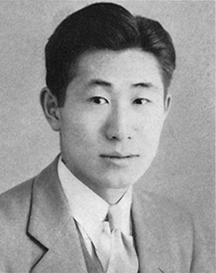
In 1932, after honing his English skills at Stearns, Sui-Lin headed south to enroll at Wharton. There he met Carl Barchfield, and the two quickly became friends. At the end of their first year, Carl’s fraternity brothers at Alpha Sigma Phi encouraged him to move into the campus house. But, they said, he would have to leave his Chinese friend behind. Carl was appalled.
“If any of you are a better man than he is,” he told them, “stand up.” The young men sat in silence. Carl and Sui-Lin remained in the Quad as roommates.
Both men joined the Christian Association, drawn in by the Rev. W. Brooke Stabler, who served as Penn’s first chaplain from 1932 to 1940. On an alumni profile form returned to Penn in 1936, Sui-Lin reported that he had played varsity soccer and belonged to F.F., the Chinese fraternity. Thirteen years later, an unknown member of that fraternity would help protect Bebe and Doug on their voyage to Hong Kong.
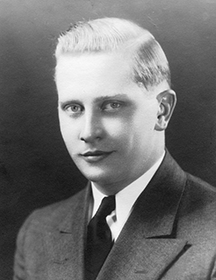
The early 1930s were a tough time, economically speaking, for many Penn students. Lai says that her grandfather earned the nickname “Prince Lin” because of his generosity in throwing lavish parties.
“He was not gallivanting,” she says, “but he was glad to be able to treat everyone and help everyone.”
According to both Lai and my mother, Sui-Lin fell in love with a Caucasian woman during his time at Penn, though her identity remains unknown. When he graduated in 1934, his father sent him on an extended cruise, stopping in Europe for a time on the long voyage back to Shanghai. When Sui-Lin finally arrived home, his family presented him with Bebe, a daughter of Christian missionaries who had been educated at Nanjing University and could speak English fluently—a coveted ability at a time when all things Western were desired. Sui-Lin married her, but for the rest of his life thought fondly of his Penn romance, says Lai, who heard about the relationship from Sui-Lin himself.
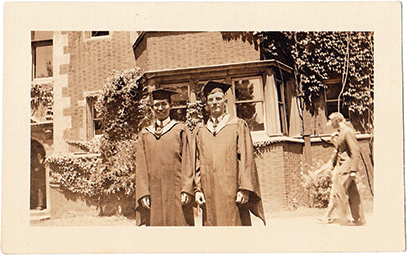
In Shanghai he had a new career, since Jing Ren established him immediately as an executive at the bank.
“The way my father described it, he was so unqualified for the position,” Lai says, laughing. “He couldn’t be the president of a bank. I think he sat at a really big desk, in a really big office, and didn’t say anything.”
In 1935, Bebe gave birth to their first son, whose American name was Louie. Four years later, Doug followed. The young family lived in an opulent home in Shanghai, the walls covered with vibrant tapestries. Many years later, as an adult living in the United States, Doug saw an auction-house ad in The New York Times—and did a double-take when he recognized one of the offerings as a wall-hanging from his childhood home.
It was a time and place where status meant everything. Lai recalls being told that on her great-grandfather’s birthday, her father and uncle had to kneel beside the older man while businesspeople, politicians, and ordinary citizens lined up to wish him happiness, bring presents, and bow deeply. The boys would accept the gifts and bow in return. Jing Ren Hsu didn’t bow to anyone.
Birth order mattered. Doug was only the second son—privileged to be sure, but not compared with Louie. The older boy was carried everywhere by servants and—even as a toddler—could get anything he wanted simply by touching it.
“It was like he was Midas,” Lai recalls being told. “Anything he wanted was his. It could be someone’s dog, or [something in] a merchant’s stall; [the servants] would pick it up and carry it with them. It was ridiculous.”
The family owned a summer home—nearly a palace, according to Lai—in the beautiful resort of Huangshan, which translates to “Yellow Mountain.” It stood on one side of a valley and had a breathtaking view. On the far side of the valley was a home owned by Chinese Nationalist leader Chiang Kai-shek.
But conditions in China were deteriorating. The country’s civil war, which had ebbed and flowed for nearly two decades, re-ignited after the Japanese surrender in 1945, and the momentum shifted in favor of the Communists. Most capitalists who had remained in business from 1927 until the end of the war had collaborated with—or at least tolerated—the invading Japanese, according to Yale history professor Peter Perdue. As the Communists advanced, business leaders had to decide whether to throw their allegiance to the new regime or flee. Sui-Lin, still young and perhaps more comfortable outside China, chose the latter. His father, Jing Ren, remained behind. The family does not know what happened to him. Chinese websites say he died in 1948.
After a brief stay in Hong Kong, the Hsu family continued on to Taiwan, then called Formosa. The conditions there were adequate, and Sui-Lin soon found work. Lai remembers Doug talking about normal things like playing ping pong with Louie—and once, after a typhoon had swamped Taipei, walking to school through chest-high waters, holding books stacked atop his head.
For Sui-Lin, the end goal was always to make it to America. But the US laws restricting Asian immigration made that tricky. Sui-Lin knew he had to ask for help. And the one person he trusted to come through for him was his old friend Carl Barchfield.
Though they hadn’t seen each other for more than 20 years, the two men had exchanged letters and gifts from halfway around the world. When Carl married his high-school sweetheart Winifred in 1935, the Hsus sent an ornate, hand-carved wooden chest that remains in my parents’ house to this day. They also exchanged names: Doug’s middle name was Carl, while my mother’s name, and mine, is Lin.
For years Sui-Lin had written to his friend about the increasingly difficult situation in his homeland, where he and his fellow capitalists were buffeted—first by the invading Japanese and then by the Communist forces. Then he told him of his flight to Taiwan. Finally he asked my grandfather if he could help him win admittance to the United States.
In June 1955, The Pennsylvania Gazette published a passionate letter from Barchfield, imploring his fellow alums to step up.
“Because of a set of cruel circumstances, Sui-Lin requires our assistance,” he wrote, explaining that what had not been taken or destroyed by the invading Japanese had been “picked clean” by the Communists, and adding: “Today Sui-Lin is thankful that he has escaped with his wife and two boys to Formosa, where he is presently employed by Civil Air Transport Service and where his wife teaches school to make ends meet …”
Noting that Sui-Lin had applied for admission to the US under the Refugee Relief Act, Barchfield wrote: “I am able to guarantee housing for him and his family and am in the process of preparing the necessary assurance forms. It is essential that he have a definite assurance of a bona-fide job to complete these forms, so we need—as quickly as possible—a definite job for him which will be passed upon by the Labor Department.”
Whether it was another Penn alum or someone else who stepped up, we don’t know. But a job was promised and on July 4, 1956, the Hsu family arrived in the United States—with just $17, according to family lore. My mother remembers that her family was at their summer home on Long Beach Island and that her father went to Idlewild (now John F. Kennedy) Airport to meet the Hsus. For several months the two families (minus Louie, who remained behind in Taiwan until later) lived together in my grandparents’ home in Madison, New Jersey. Lai remembers her father speaking of my mother’s kindness to him. Even though Doug didn’t speak the language, she included him in outings with her friends.
Though he was set to attend the local high school, another Penn friend intervened at the last minute with a better option: St. George’s School in Rhode Island. Brooke Stabler, Penn’s former chaplain, used his influence to get Doug admitted there on a full scholarship. Though he struggled to keep up on account of the language gap, he capitalized on his academic and athletic gifts, becoming popular as a successful member of the basketball, soccer, and tennis teams. During those early years in the US, his family could not even afford to pay his train fare to New Jersey during holiday breaks, and he stayed on campus for three years straight until he graduated in 1959.
Meanwhile, the elder Hsus gradually reestablished themselves in careers. Sui-Lin taught finance at Seton Hall University, while Bebe worked in laboratories at Ciba Pharmaceutical. The couple settled in a tiny two-bedroom apartment in a utilitarian cinder-block building in Newark. Nearly 60 years later, my mother can still remember the address. “It wasn’t in an area that looked dangerous, but it wasn’t where you wanted to live,” she recalls.
The couple lived there for the rest of their lives. Sui-Lin died in 1986. Bebe lived to see the new millennium.
“She literally never, ever looked back,” Lai says. “I don’t know how a person can do that.”
My mother’s memories are similar: “I never heard one word of complaint from either one of them ever about what happened to their lives,” she says. “That’s a place where somebody could be very bitter. But they weren’t.”
Five years ago, my mother reached out to Doug. She hadn’t seen him for 35 years, but as a former history teacher, she had always been interested in her own family stories and, since the mid-1990s, had spent hours combing through documents in genealogy libraries run by the Mormon Church. She viewed his story as integral to her own.
And so one day she and my father drove to a Chinese restaurant in Clinton, New Jersey. Shortly after they got there, a luxury convertible pulled up, and an older man got out. It was Doug. He had just come from playing tennis, and he looked exactly as my mother remembered him. They shared stories of their lives—of retirement and grandchildren, and his last visit to see my grandparents in Arizona—as well as memories of those months in 1956 when they were teenagers thrown together in my grandparents’ house in Madison, New Jersey.
Although Sui-Lin’s family had not risen to the level of prominence that Jing Ren Hsu once enjoyed in Shanghai, Doug had definitely found success. He had worked for many years as an executive at New York Life Insurance Company. Then he and his second wife, Hui Lan Hsu, had started a restaurant. He paid for Lai, his daughter, to attend St. George’s, where he had been welcomed on a full scholarship so many years before. It seemed that his father’s dream—that his descendants would find opportunity in the United States—had been fulfilled.
After their reunion, Doug and my mom kept up a steady email correspondence. They exchanged some more memories about their shared history and he forwarded occasional funny emails. Then, in February 2011, the emails stopped. Doug, an avid tennis player, had died of a sudden heart attack.
My mother had never met Jennifer Lai, but she wondered if she might be able to track her down and extend the two families’ connection another generation. She and I discussed looking for Lai during our Christmas visit in late 2011. Knowing that she was a lawyer in New York, I poked around online and found a LinkedIn profile for a woman by that name that also listed St. George’s. We were ecstatic. It had to be her. My mom called the law firm that was listed on Lai’s profile, but found that Lai had left her position not long before, to stay home with her new baby. Surprisingly, the firm gave us her home email address.
We crafted a carefully worded message introducing my mom as Carl Barchfield’s daughter and asking if Lai was Sui-Lin Hsu’s granddaughter. We pressed send and crossed our fingers.
My parents were flying home to California that day. While they were waiting in a restaurant at Newark airport– just a few miles from the apartment where Sui-Lin and Bebe settled to begin their new life—my mom’s phone pinged, signaling that she had a new email. It was from Lai. Her response was warm and enthusiastic about rebuilding the connection.
“Oh my God—I was just elated,” my mom remembers. “She obviously wanted to get in touch with us, too.”
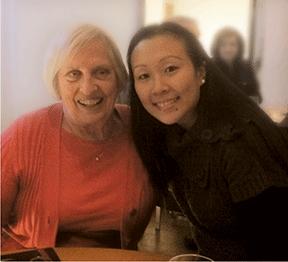
And so, in the spring of 2012, my mom and Lai finally met face-to-face for dinner. The site was The Modern in midtown Manhattan, and their conversation was easy—like old friends putting together a puzzle to which each has only a portion of the pieces. Lai told my mom about the stories her father and grandparents had recounted to her about their life in China and their journey to America. My mom shared her memories of their earliest days in this country. She is nearly the only person alive who still remembers.
Today the two women email regularly and have met for dinner each time my mom travels from her home in California to the East Coast. Lai still refers to my grandfather as “Uncle Carl,” as her father always called him. She makes it clear that her grandparents cherished the friendship that began in the Quad more than 80 years ago.
“They were so grateful that they got here with their lives and the lives of their children, and that was everything,” she says. “Because of how Uncle Carl stayed with him, stayed with our family, our whole history changed. They were like brothers.”
Christine Lutton Foster C’93 is a freelance writer based in Durham, Connecticut.


I can add a little bit to this wonderful and wonderfully researched story. When Carl Barchfield set out to help the Hsu family, my parents were among those he contacted. Carl and his wife Winnie were friends of my parents–Donald Frederick Kent and Virginia Golden, from high school in East Orange. Carl and Donald both went to UPenn, Carl at Wharton and Donald in medical school. Both men married their high school sweethearts and they all remained lifelong friends. My parent helped find Sui-Lin Hsu a job to enable his and his family’s immigration. They reached out to close friends, Rick and Dorothy Hammer. Dottie had a rich businessman father, Mr. Rossi (sorry I can’t remember his first name), who was able to guarantee him a job.
Doug and I were of similar age and hung out when our families got together, which was fairly often when they first arrived. I remember Doug saying he was worried because he hadn’t yet learned enough English but was already beginning to forget his Chinese.
The shameful part of this story is the prejudice the Hsu’s encountered when house hunting. Carl and Winnie and Donald and Virginia tried to find them a place in the towns they lived in–Madison and Chatham, NJ. No one would rent to Chinese. Thus they moved to Newark, which accepted them.
I believe the older son didn’t come with them because he was of draft age in Taiwan and unable to emigrate. I don’t recall if he ever moved here.
As you can tell from the article Sui-Lin and Bebe were very intelligent, capable people. They were also charming and fun to be around.